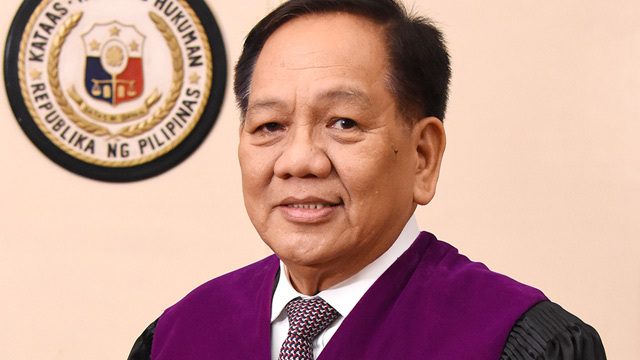SUMMARY
This is AI generated summarization, which may have errors. For context, always refer to the full article.

MANILA, Philippines – Supreme Court (SC) Associate Justice Diosdado Peralta said on Wednesday, October 2, that trial court judges were “wrong” to acquit drug suspects based only on his 2018 ponencia that says weak drug cases shall be dismissed.
“That’s the problem, your honor, when judges, they do not have the skills to be confronted with this. Basta inisip na lang, ah gamitin to acquit ng acquit. Mali (They just thought that they would use it to acquit and acquiat. That’s wrong),” Peralta told the Judicial and Bar Council (JBC) on Wednesday during his public interview for the position of chief justice.
Peralta defended his ruling after the Philippine Drug Enforcement Agency (PDEA) complained of “an alarming increase in the number of dismissals or acquittals made in undue haste” because of the decision.
JBC member retired justice Jose Mendoza took the opportunity to ask the ponente himself about the decision, which has been a hot topic lately, on Wednesday.
Peralta said the decision should have been applied prospectively, meaning it was wrong for judges to acquit suspects in cases which were already on trial before the ruling was handed down.
Peralta also said judges should dismiss weak cases without prejudice to refiling, and should not just acquit suspects outright.
What decision? Peralta wrote the 2018 decision People vs Lim, where the High Court acquitted Romy Lim of Cagayan de Oro because the arresting team did not follow the chain of custody in marking and handling the seized drugs as evidence.
Republic Act No. 9165 or the Dangerous Drugs Law requires the arresting team to conduct a physical inventory and to photograph evidence in the presence of the accused or his representative, an elected public official, and/or a member of the media and a member of the Department of Justice (DOJ).
In that decision, Peralta said it should be “mandatory policy” to follow the above rules “in order to weed out early on from the courts’ already congested docket any orchestrated or poorly built up drug-related cases, the following should henceforth be enforced as a mandatory policy.”
The PDEA wrote the SC in October 2018 to ask the High Court to issue more detailed guidelines regarding the decision, but the Court refused to do.
How should the ruling be applied? The Court instead reiterated that the ruling should be prospective, meaning it should apply only to cases after the decision was promulgated on September 4, 2018.
Peralta said he was “shocked” when he learned that some trial courts were acquitting suspects in drug cases which were on trial even before the decision was issued.
“In fact, I instructed one of the judges there, you better recall your order of dismissal. Why? Nagtrial ka na eh, e ‘di meron ka nang probable cause. Nagtrial ka na eh, why do you have to go back na walang probable cause?” said Peralta.
(In fact I instructed one of the judges there, you better recall your order of dismissal. Why? You already held trial, you already found probable cause. Why did you have to go back and say there was no probable cause?)
Should suspects be acquitted? Peralta said that as for the cases filed before the courts after the decision, judges should also not acquit suspects based only on the ruling.
Peralta explained that judges should only dismiss the cases without prejudice to a refiling so that cops can have the chance to justify their non-compliance to the rules.
Peralta reminded prosecutors to also ask cops for the justification, so they can refile the case before the court.
“‘Yung public prosecutor na hindi na probably aware of the importance of this procedure, hindi na tinatanong sa pulis why there were no barangay, bakit walang ganito, hindi na tinatanong eh, hindi na ja justify ‘yung absence,” said Peralta.
(The public prosecutor who was not probably aware of the importance of this procedure, they did not ask the policeman, why was there no barangay official, why was he not here, they did not ask anymore, so the absence was not justified.)
Peralta has been advocating for reforms in the handling of drugs cases, being the ponente also of Estipona vs Lobrigo, where the SC allowed plea bargaining in small time drug cases.
Peralta earlier said “we are failing in drugs cases” due to the sheer volume of cases being filed, overwhelming both prosecutors and courts. – Rappler.com
Add a comment
How does this make you feel?
There are no comments yet. Add your comment to start the conversation.